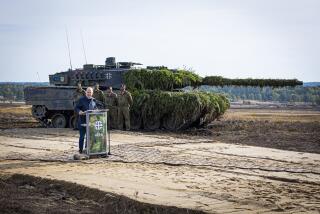Kohl ‘Cover-Up’ in Libya Plant Furor Is Denied
- Share via
BONN — The government denied Saturday that Chancellor Helmut Kohl had been involved in a political cover-up by trying to exonerate West German firms from complicity in building a chemical complex in Libya.
The denial was prompted by the charges of opposition politicians that Kohl had engaged in evasive statements and “cover-up attempts” in asserting the week before last that there was not enough evidence to indicate that West German companies helped in the plant’s construction. Kohl changed positions late last week and has now publicly admitted the likelihood of the West German private role.
The U.S. government charges that the facility is designed to produce chemical weapons, while Col. Moammar Kadafi, the Libyan leader, says the factory is intended only for making pharmaceuticals and other medicine for civilian use.
Admits Earlier Alerts
The Bonn government’s chief spokesman, Friedhelm Ost, admitted that the government was alerted as long ago as October to the possible involvement of West German firms in design and construction of the Libyan plant.
But he said Saturday that the evidence against the companies at that time was slight and that publicizing the information would have adversely affected government investigations into the charges.
Previously, Ost indicated that Kohl and Foreign Minister Hans-Dietrich Genscher were informed only in November by Washington that the United States had specific information concerning West German firms hired for help on the plant at Rabta, about 40 miles southwest of the Libyan capital of Tripoli.
Then on Friday, it emerged that the West German intelligence service--the BND--reported secret information from the Middle East in September and October last year that the plant was designed to make chemical weapons and that West German companies were among the plant’s supply contractors.
Slow to Be Convinced
Apparently, Kohl did not take the reports from his own intelligence service seriously enough, nor was he persuaded when informed in mid-November by President Reagan and Secretary of State George P. Shultz of hard U.S. evidence that specific firms were involved.
Political observers here found it difficult to explain why Kohl would deny facts that were bound to surface, some of which had been developed by his own secret intelligence agency.
“He may have been extremely legalistic and cautious,” one political source here commented, “or it may simply have been his usual bumbling.”
Behavior ‘Outrageous’
“Against this background,” Social Democratic Party leader Hans-Jochen Vogel charged Saturday, “his behavior in this matter is downright outrageous.”
Members of Genscher’s Free Democratic Party, a junior partner in the governing coalition, called Saturday for a parliamentary inquiry into the government’s actions in the Libyan chemical plant affair.
Spokesman Ost, in denying a cover-up, explained Saturday, “From the very beginning, the government took very seriously every indication of possible, even indirect, participation by German firms in the chemical factory in Libya.”
But he did not say why Kohl went out of his way to exonerate the firms in the face of a growing wealth of evidence against them marshaled by U.S. and German intelligence organizations and the West German media.
Focus of Investigations
West German investigations now under way focus on the activities of a Frankfurt branch of IBI Engineering, a firm headed by a London-based Iraqi named Ihsan Barbouti that allegedly supervised the design, supply, and construction of the Libyan plant at Rabta. Also an object of investigation is the chemical firm Imhausen-Chemie of Lahr in southern Germany.
IBI’s Frankfurt office has closed, but investigators are examining company documents obtained from the firm’s former attorney.
The current case is not the first time Bonn has been slow to pursue tips by the American government about West German companies breaking export-control laws.
Four years after being alerted by the U.S. officials--in 1984--the Kohl administration finally investigated charges that West German suppliers were involved in equipping an Iraqi chemical weapons factory.
Earlier this month, the Kohl government admitted that 38 employees from five West German firms sold equipment and technology to Baghdad, which “in all probability” was used in an Iraqi poison gas plant.
More to Read
Sign up for Essential California
The most important California stories and recommendations in your inbox every morning.
You may occasionally receive promotional content from the Los Angeles Times.









